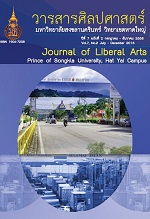Model of knowledge management for teacher development: A case study of Nampudpotaram Cluster School Trang Primary Educational Service Area Office I
Keywords:
model of knowledge management, teacher Development, ethicsAbstract
The purposes of this research were to develop the knowledge management model, and examine effects of using developed model of knowledge management for teacher development. The samples, purposively selected, were 96 persons within cluster schools. The study was conducted in four stages. The first, content analysis was employed to explore concepts of knowledge management and teacher development. The second, proposed model of knowledge management for teacher development was conducted through focus group of twelve experts so as to consider the appropriateness and feasibility. The third, the researcher tried out, evaluated and developed knowledge management model through the focus group of twelve participants. In the last stage, effects of teacher development by using knowledge management model was conducted in order to confirm its effectiveness. An in-depth interview protocol was employed to investigate reflections on its effectiveness. The findings were as follows: the model of knowledge management for teacher development was composed of six parts: knowledge identification, knowledge sharing, knowledge creation, knowledge storage, knowledge utilization, and knowledge assessment, the development of knowledge management process in the third stage, knowledge creation was replaced by knowledge acquiring. This study revealed that after using the developed knowledge management model with the targeted groups at school cluster, teachers could perform better ethical behaviors such as, a role model, love and goodwill, sacrifice, fairness, good attitude, self-responsibility, recognition to learners, punctuality of work, temptation avoidance, and diligence with patience, indicating the appropriateness and effectiveness of the model. However, the effectiveness and practices of the developed knowledge management model depends on networking, especially collaboration, interaction, and communication. Shared vision, team-working, leadership were also critical components of the model.
Downloads
Published
How to Cite
Issue
Section
License
Copyright (c) 2016 วารสารศิลปศาสตร์ มหาวิทยาลัยสงขลานครินทร์ วิทยาเขตหาดใหญ่ (Journal of Liberal Arts Prince of Songkla University Hat Yai)

This work is licensed under a Creative Commons Attribution-NonCommercial-NoDerivatives 4.0 International License.
The authors retain the copyright to their article but the Journal of Liberal Arts, Prince of Songkla University reserves the exclusive rights to first publication.






